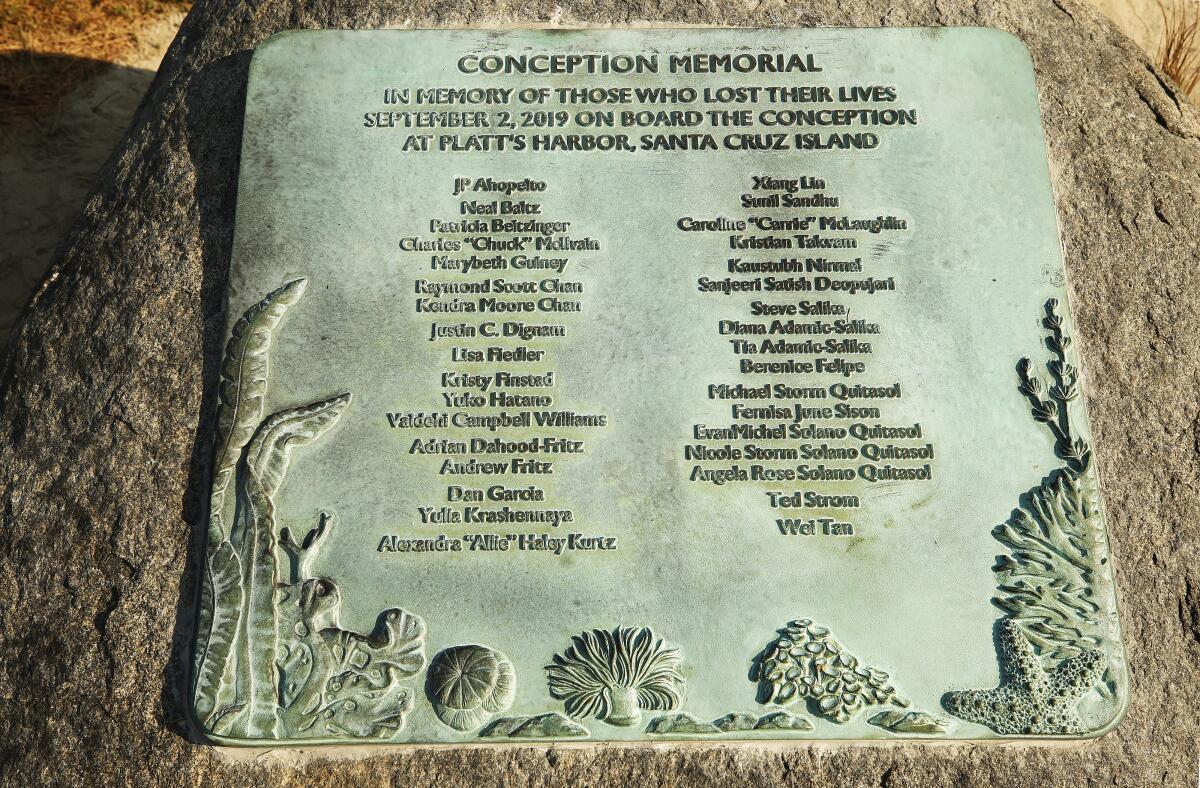Coast Guard’s failure to act on boat safety costs lives in Conception fire, feds say

- Share via
SANTA BARBARA — Federal investigators on Monday criticized the U.S. Coast Guard for failing to heed years of boat safety recommendations, saying more aggressive action could have prevented the 2019 boat fire that killed 34 off the coast here as well as other deadly maritime incidents.
Jennifer Homendy, chairwoman of the National Transportation Safety Board, speaking before a congressional transportation subcommittee, described decades of intransigence by the Coast Guard, which is meant to regulate maritime safety.
Monday’s hearing in Santa Barbara was a short trip from where the Conception dive boat burned off the Channel Islands on Labor Day 2019, the worst maritime disaster in modern California history.
“Since 1999, we’ve investigated three accidents involving passenger ferries in New York, a deadly fire on the small passenger vessel Island Lady in Florida and duck boat accidents in Arkansas, Pennsylvania and Missouri,” Homendy said. “Including the Conception, a total of 86 people died in these tragedies. Eighty-six lives were lost unnecessarily. Eighty-six people who have left behind bereaved families and friends. That’s a lot of lives impacted.”
She alleged that after each disaster, the NTSB issued multiple recommendations to the U.S. Coast Guard to close safety gaps, yet many remain unfulfilled. She said it should not take an act of Congress, as it did in the wake of the Conception disaster, to get reforms.
Coast Guard officials defended their response to the boat incidents, saying the agency had to balance the NTSB’s recommendations with the economic effects on the maritime industry. They also said boat operators and owners had a responsibility for creating a culture of safety.
On March 28, the Coast Guard will implement interim fire safety rules for small boats requiring fire detection systems, proper dual escape routes and emergency escape drills. Congress mandated those provisions in December 2020 as part of the Elijah E. Cummings Coast Guard Authorization Act.
Even with those changes, Homendy said, safety gaps persist.
“There are currently 19 open NTSB recommendations regarding small passenger vessels. One of those recommendations would require operators to implement a preventative maintenance program. We issued it 20 years ago; another would require operators to implement a safety management system, which we also issued 20 years ago. We reiterated that in 2012, again in 2018 and again in 2020 following numerous tragedies,” she said.
The safety management system Homendy credits with preventative maintenance for reducing air crashes is now being considered by the Coast Guard for small passenger vessels.
The NTSB investigation found that the Conception dive boat did not operate a roving watch, a failure that allowed the fire in the middle deck to go undetected for up to half an hour.
Five of the crew were sleeping on the top deck when the fire broke out in the middle of the night and trapped 33 passengers and one crew member below deck.
Jerry Boylan, the boat’s captain, has been charged with 34 counts of seaman’s manslaughter by federal prosecutors. The NTSB found the Coast Guard did not check on roving watches.
Coast Guard Rear Adm. John W. Mauger acknowledged at the hearing Monday that a monitoring device to ensure that a night watchman will stay awake and do rounds of the vessel won’t be fully implemented March 28.
Mauger said the vessel operators are only “required to submit their plans for how to come into compliance” next week.
“We’ll work very closely with the different small passenger vessel operators to ensure that those plans meet ... the regulation and safety recommendations,” he said.
He said that Coast Guard inspectors are making spot checks on vessels to make sure people were “awake and alert and were standing proper watches while they were underway.”
The rear admiral said that the Coast Guard, in implementing new rules, is required to consider the economic costs and benefits of implementation and that it was only because of the legislation that the Coast Guard could bypass that process.
Homendy, the NTSB chairwoman, said in an interview that “lives are priceless. You can’t put a price on saving lives.”
She said the Coast Guard has long stalled vital recommendations such as voyage data recorders for smaller passenger vessels and required them only for international traveling ships. Without such data recorders, Homendy said, it is like investigating an air crash without the plane’s black box.
The parents of Charles McIlvain, a diving enthusiast killed in the fire, said at the hearing that it is a disgrace that yet again the Coast Guard is stalling on implementation.
“It is really sad that it has taken this long,” father Clark McIlvain said.
Kathleen McIlvain noted that the current improvements are only interim rule changes, and she said the family won’t give up until they know it cannot happen again.
Rep. Salud Carbajal (D-Santa Barbara), who co-authored legislation that led to the changes after the fire, said he had written a new measure requiring the Coast Guard to quickly follow the NTSB’s recommendations.
Carbajal, Rep. Grace F. Napolitano (D-Norwalk) and Homendy later accompanied the Conception victims’ loved ones to a memorial at the end of Santa Barbara Harbor and laid flowers.
After Carbajal spoke the names of the 34 who died listed on a bronze placard on a rock near the end of the harbor wall, he acknowledged the families’ fight for reform.
“Disappointments remind us of the work ahead,” he said.
More to Read
Sign up for Essential California
The most important California stories and recommendations in your inbox every morning.
You may occasionally receive promotional content from the Los Angeles Times.











